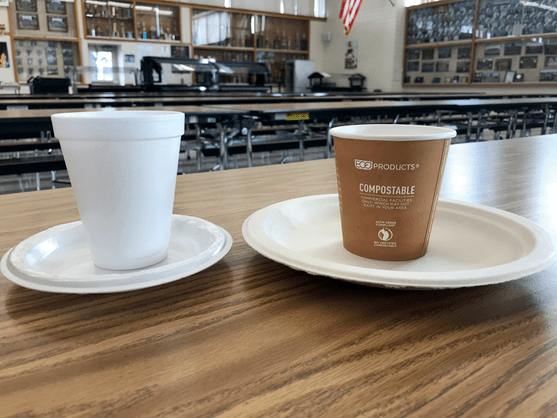San Benito High School trades its styrofoam foodware for eco-friendly paper goods
September 16, 2019
With encouragement from student leaders of a campus Environmental Club, the San Benito High School Board of Trustees on Feb. 12 adopted a resolution to end the use of polystyrene foodware on campus.
Commonly referred to as styrofoam, polystyrene is difficult and expensive to recycle and can contain toxic chemicals such as styrene and benzene, which are neurotoxins.
“While safe to use as a plate or a cup for food consumption, the product can release these toxins when it becomes heated” as they are burned or melted down, said SBHS Food Supervisor Jim Lewis. “The cafeteria was using styrofoam bowls on our fruit and yogurt bar as well as for our soups when we feature them on our salad bar. We also used foam cups for hot and cold beverages when catering.”
Following the district’s decision to ban the use of styrofoam, “We are proud to say that we are now using eco-friendly paper goods for all of our food and beverage needs,” Lewis said, noting that food services is now using heavy weight paper goods that are renewable and compostable.
In a statement from the Environmental Club, co-presidents Shelby O’Neil and Ian Sills said the club is “elated” about the ban.
“We would like to express our gratitude to Principal Adrian Ramirez and Superintendent Dr. Shawn Tennenbaum for their assistance in this project,” the two seniors said in the joint statement. “The two administrators have shown nothing but respect and ambition in addressing sustainability concerns on campus.”
Sills, who has been accepted to Stanford University, and O’Neil, who founded the nonprofit Jr. Ocean Guardians to teach school children about the importance of oceans, said the Environmental Club “recognizes the necessity of teaching students how to live sustainably.” O’Neil had previously convinced Alaska Airlines to stop using plastic straws and toothpicks on all of its flights as part of her “No Straw November” initiative.
“A major part of living a sustainable life is using sustainable materials,” they said in their announcement. “Consequently, the Environmental Club has pursued this polystyrene ban since the beginning of the school year in order to avert the use of this harmful and environmentally detrimental material on campus.
“It is rewarding to see that the school district listens to students and acknowledges the necessity of sustainable initiatives,” they added. “We hope that this policy will be just another step in the process of making San Benito High School more sustainable.”
“It is rewarding to see that the school district listens to students and acknowledges the necessity of sustainable initiatives.”–Shelby O’Neil and Ian Sills, Co-presidents of San Benito High School Environmental Club
Lewis, the food supervisor, said he has not spoken with other schools who have a similar ban on styrofoam, “but I am proud to be a part of this one.” He does not anticipate any issues switching to sustainable food containers, as they are already in his department’s inventory.
All bins in the cafeteria and around campus will be clearly marked and accessible to make sure students are recycling the environmentally friendly food and beverage holders.
“I think this is a great opportunity to begin taking the first steps on what will be a very beneficial journey for everyone involved,” Lewis said. “Unlike most footprints that blow away in the wind and become unnoticed, this footprint will be sure to have a lasting impact on future students and generations at San Benito High School.”

Styrofoam cups and plates, as shown at left, are being replaced by compostable, recyclable foodware at the encouragement of the San Benito High School Environmental Club.
Change was advocated by campus environmental club


